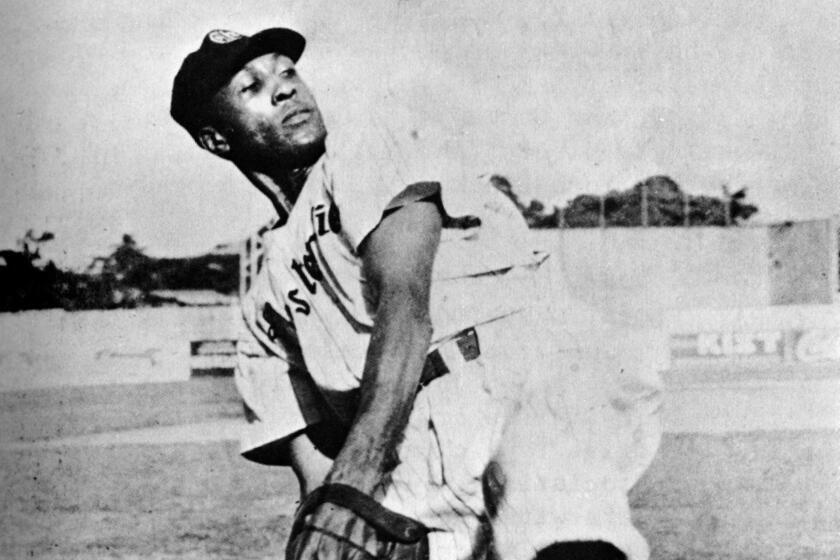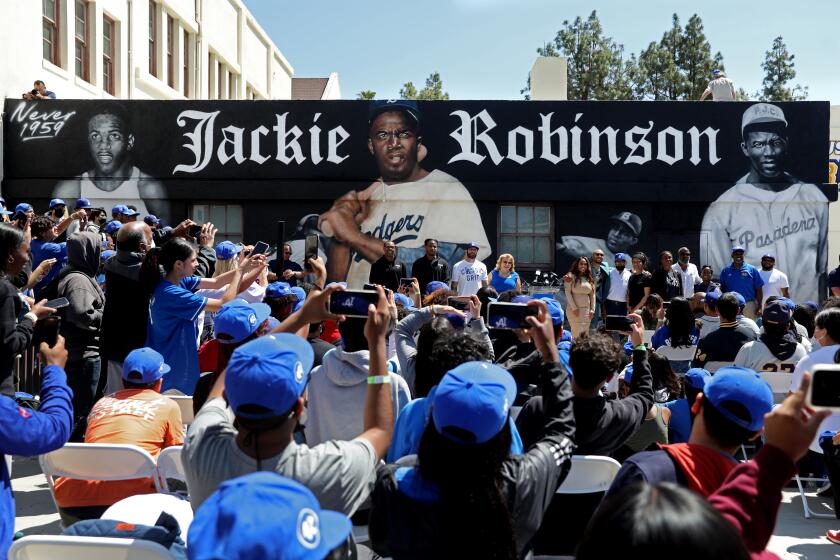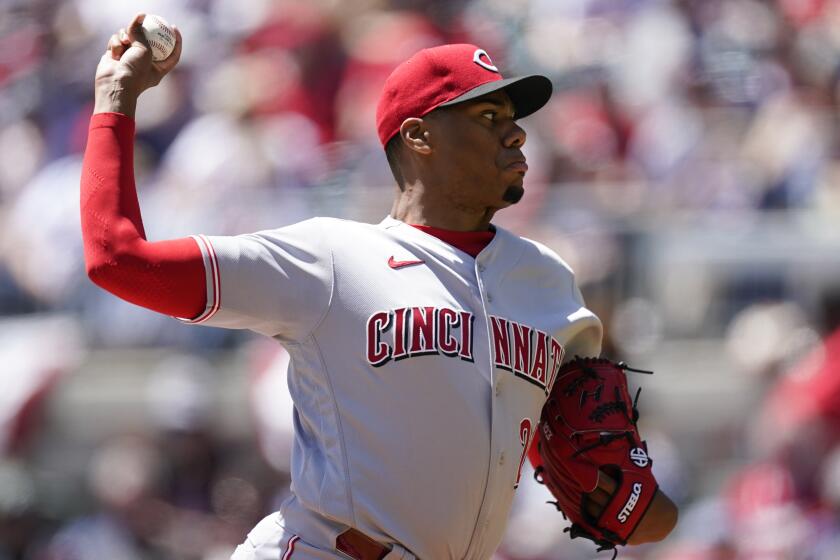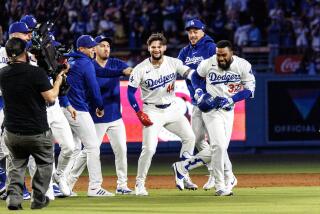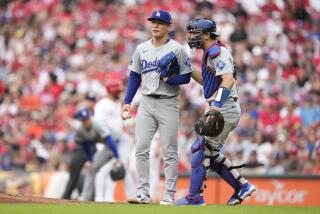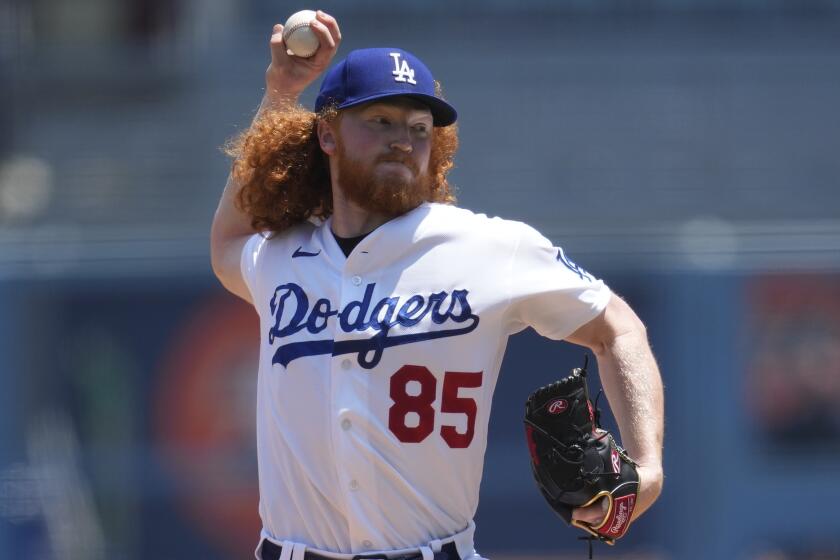Hunter Greene’s record speed thrills, but Julio Urías outduels him in Dodgers’ victory
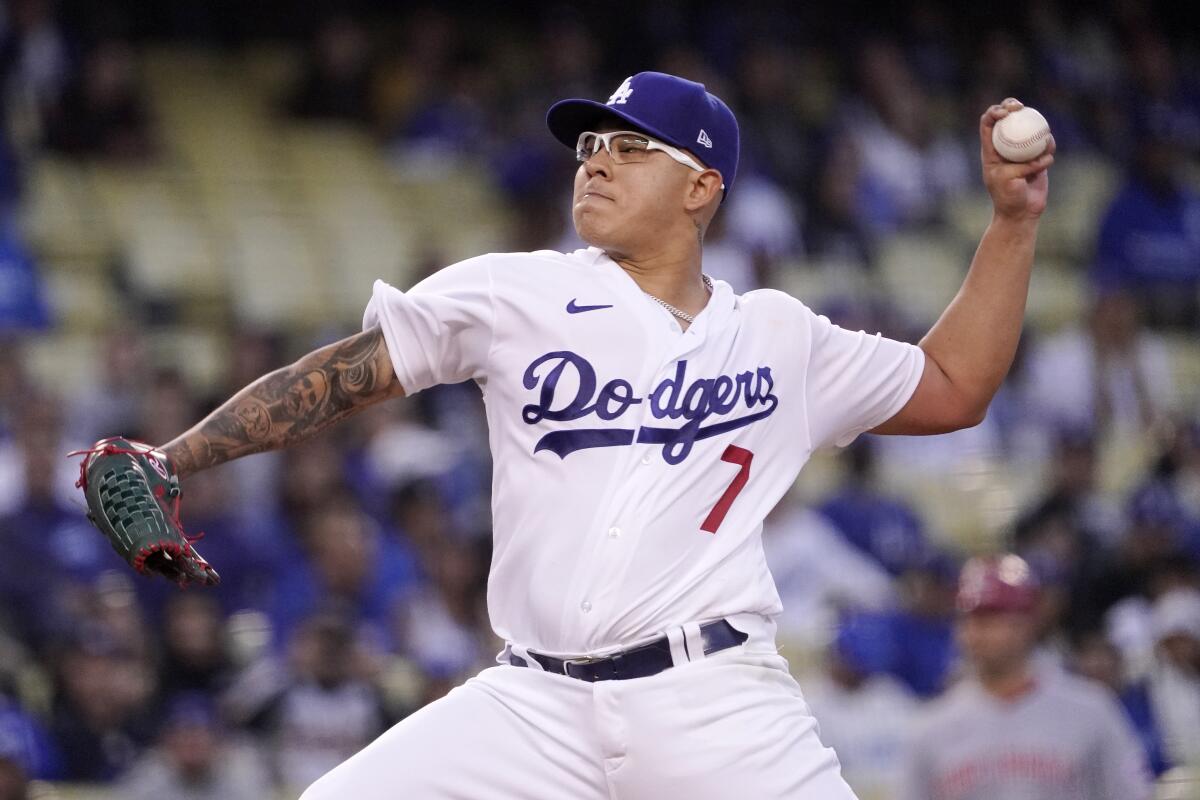
It’s likely no one had compared Julio Urías to a tortoise. Because he hails from Culiacan, Mexico, his nickname is “Culichi,” not “Tortuga.”
But reach high atop that dusty bookshelf and grab “The Tortoise and the Hare” from Aesop’s Fables. Cast Cincinnati Reds triple-digit wonder Hunter Greene as the speedy hare. Urías and his slow-pokey pitches topping out at 93 mph are you-know-who.
We all remember who won that race.
This one followed a similar script. The Dodgers got to Greene in the sixth inning and cruised to a 5-2 win Saturday night in front of 50,039 at Dodger Stadium.
Former Negro Leagues star pitcher Chet Brewer mentored Black players from Los Angeles and helped them reach the majors, including Jackie Robinson.
Greene, a former Sherman Oaks Notre Dame High star making his second major league start in front of family, friends and fellow alums from the MLB Urban Youth Academy in Compton, reached or exceeded 100 mph more often than any other pitcher since pitch tracking began in 2008.
In fact, he obliterated the previous record of 33 100-plus-mph pitches set by the New York Mets’ Jacob deGrom last June. Greene caught and passed deGrom as rapidly as his offerings reached the catcher’s mitt, hitting triple-digits 11 times in the fifth inning alone. He had 39 in the game.
“We faced a tough customer in Hunter Greene,” Dodgers manager Dave Roberts said. “We had to scratch and claw. It’s a special arm.”
Once his four-seam fastball dipped under 100, the Dodgers drilled it. Austin Barnes stroked a single to right on a 98.7-mph pitch to lead off the sixth, and Trea Turner — batting leadoff because Mookie Betts had the evening off — followed with a home run on a 98.9-mph pitch for a 2-0 lead. Turner also singled twice, extending his hitting streak to 27 games.
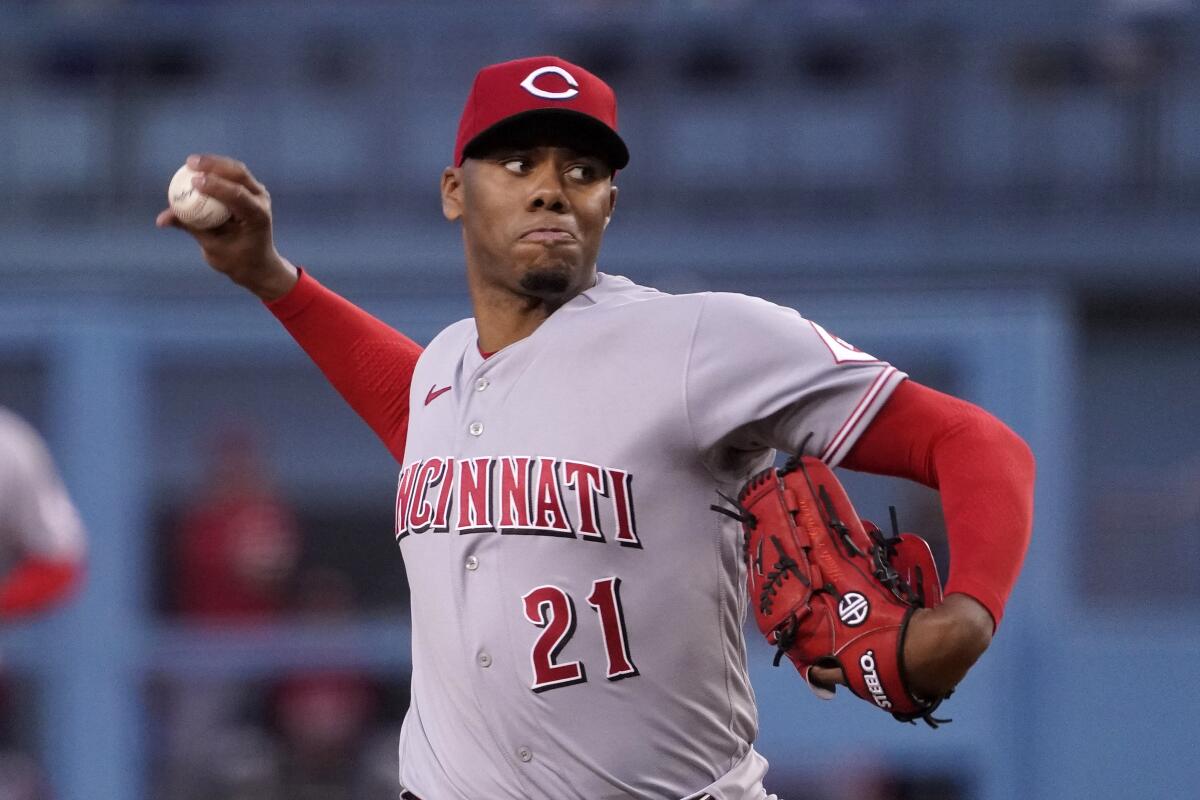
Greene was lifted with one out in the sixth, having thrown 80 pitches, 50 for strikes. The average speed of his 57 fastballs was 100.2 mph and his command was admirable — he walked none and struck out six. Buck Farmer replaced him, and a two-out, two-run single by Chris Taylor doubled the Dodgers’ lead to 4-0.
Urías matched Greene pitch for pitch — albeit at a comparative crawl — through five innings. Not until Tyler Stephenson drilled a one-hop shot through second baseman Max Muncy with one out in the fifth did Urías allow a hit.
Six days after getting shelled by the Colorado Rockies with alarmingly diminished velocity, the Dodgers left-hander mowed through the Reds’ lineup. He sat at 92-93 mph, a tick lower than his 94-mph average last season when he went 20-3, but better than the 91-mph fastballs the Rockies saw.
Roberts lifted him after 65 pitches, citing his slow build-up during the abbreviated spring training. The Dodgers added a run in the seventh, and the Reds scored both of theirs in the ninth.
“I felt like myself,” Urías said. “It felt strange last week in Colorado. But I made adjustments, worked on mechanics, and it felt good.”
Dodgers players take part in the unveiling of a Jackie Robinson mural, listen to an address from his son and honor Robinson’s wife before win over Reds.
Greene might have been outdueled by the crafty Urías, but his immense talent is obvious and he has aspirations outside the chalk lines. To introduce Black youngsters to the allure of the national pastime. To grow the game to new demographics in new markets across the globe. To establish his own legacy as an ambassador for the game in disadvantaged communities.
Those dreams began 15 years ago when he joined the Urban Youth Academy, and he repeats them now as a 22-year-old Reds rookie, not shy about stressing the significance of pitching at Dodger Stadium 24 hours after Jackie Robinson Day.
“To be here as a Black player and as a young man to represent him and what he stood for is super important,” he said, pausing to gather himself as tears welled. “To shed that light on our community as well, and let these kids know they can do it, and do it with grace, and always be poised, and to represent.
“It’s not just about yourself. It’s about your family and the next generation that follows.”
Greene’s impact will be predicated on him pitching well. Should he become another overhyped phenom who flames out prematurely, those noble dreams will die along with his career. Saturday’s performance was an encouraging step.
Stardom has long been projected for Hunter Greene, who played at Sherman Oaks Notre Dame High. On Saturday, he will pitch at Dodger Stadium for the Cincinnati Reds.
At least one player in the Dodgers’ dugout pulled for Greene. David Price, a Black pitcher who was the first overall pick in 2007, sees a younger version of himself in Greene, who was the second overall pick in 2017.
“I see how hard he works,” Price said before the game. “I know he was raised well. I can see that. I’m for him. Hopefully we score three unearned runs, he goes six innings, then we pour it on.”
Turned out two runs were unearned and there was no need to pour it on. Greene was impressive, Urías was better, and the Dodgers (6-2) won their fifth in a row.
Revisiting pursuit of perfection
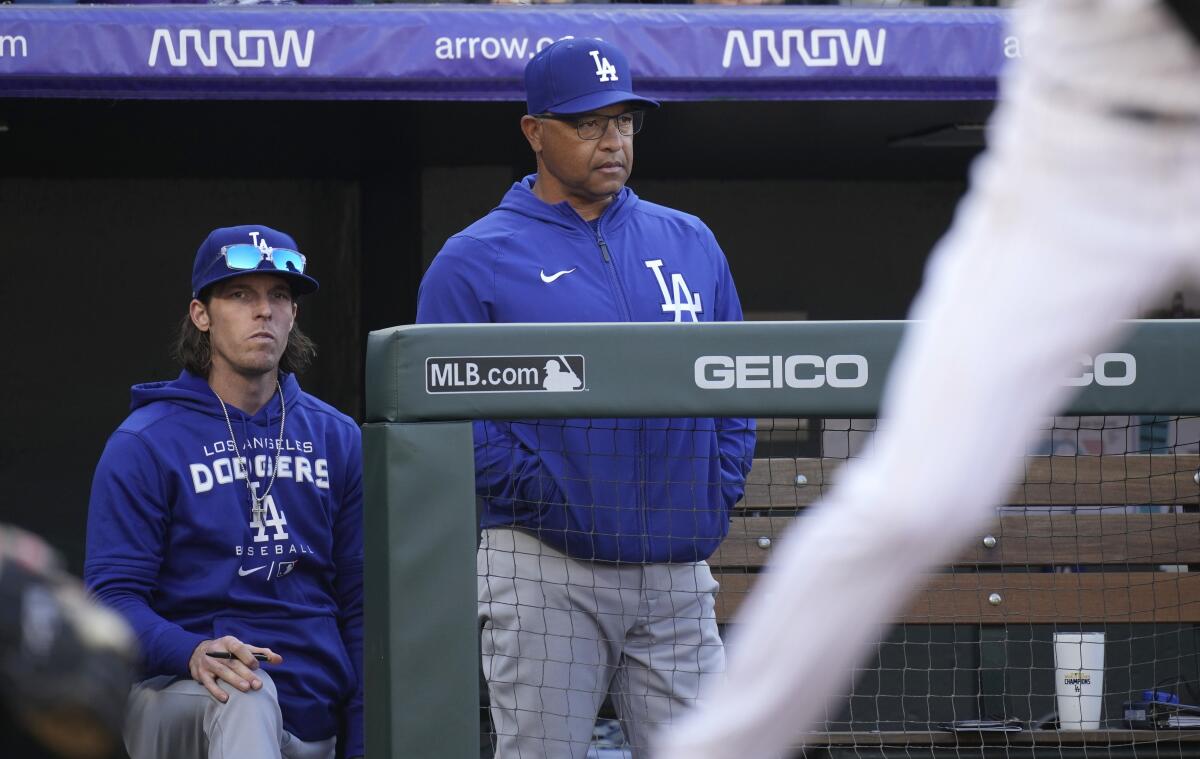
In addition to lifting Clayton Kershaw after seven perfect innings Wednesday against the Minnesota Twins, Roberts made another decision that spoke to how little a perfect game meant to him.
The Dodgers led 3-0 in the seventh and Roberts had Blake Treinen warming up. Had the score remained a save situation, he likely would have gone with Treinen in the eighth and Craig Kimbrel in the ninth, maximizing the probability the Dodgers could have come away with a combined perfect game.
Cody Bellinger, Gavin Lux and Barnes hit consecutive home runs in the eighth, however, and with a comfortable 6-0 lead Roberts instead went with middle reliever Alex Vesia in the bottom of the inning. Vesia retired the first batter, but Gary Sanchez singled, ending the shot at the 24th perfect game in history.
Roberts opted to keep Treinen and Kimbrel rested with the Dodgers’ home opener looming the next day. Treinen believes his manager made the right decision.
“Once we doubled the score, the decision wasn’t difficult,” he said. “Get other guys work. We are thinking about winning ball games, many ball games.”
From an afterthought to indispensable
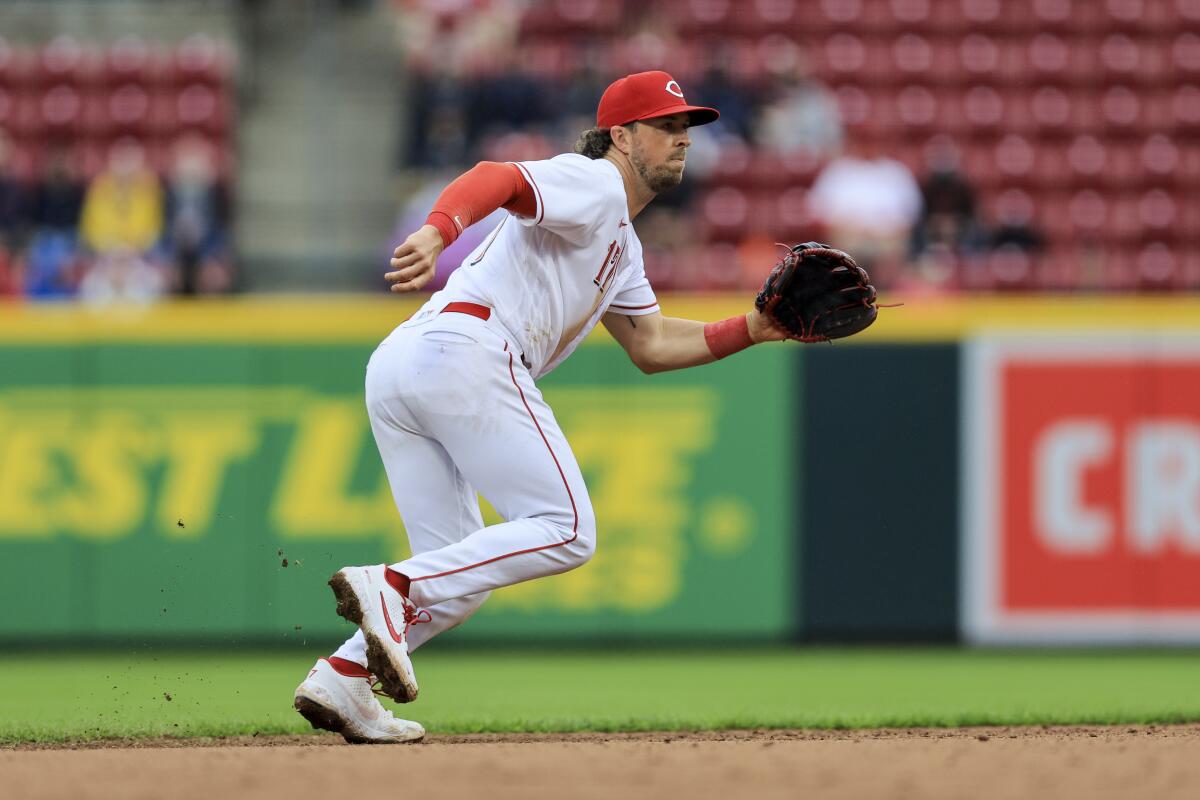
Kyle Farmer was a throw-in, the last piece in a huge salary dump of a trade after the 2017 season that sent Yasiel Puig, Matt Kemp, Alex Woods and Farmer from the Dodgers to the Reds for Homer Bailey, Jeter Downs and Josiah Gray.
Farmer broke into the big leagues with the Dodgers as a backup catcher and light-hitting utility infielder, and that’s about all the Reds expected from him. But last season he stepped into a starting role at shortstop and flourished, batting .263 with 16 home runs and 63 RBIs in 147 games. He made only five errors, and advanced fielding metrics had him above average.
The job again was his in spring training, much to his relief.
“I strictly focused on shortstop, which was cool,” Farmer told reporters during spring training. “Being able to not have to put on the catcher’s gear was really nice, and not having to do blocking drills and worry about that. It’s hard to concentrate on catching and infield, because it’s two polar-opposite positions.”
Farmer, whose salary jumped from $640,000 to $3.155 million in his first year of arbitration, went one for four Saturday and is batting .300.
More to Read
Are you a true-blue fan?
Get our Dodgers Dugout newsletter for insights, news and much more.
You may occasionally receive promotional content from the Los Angeles Times.
